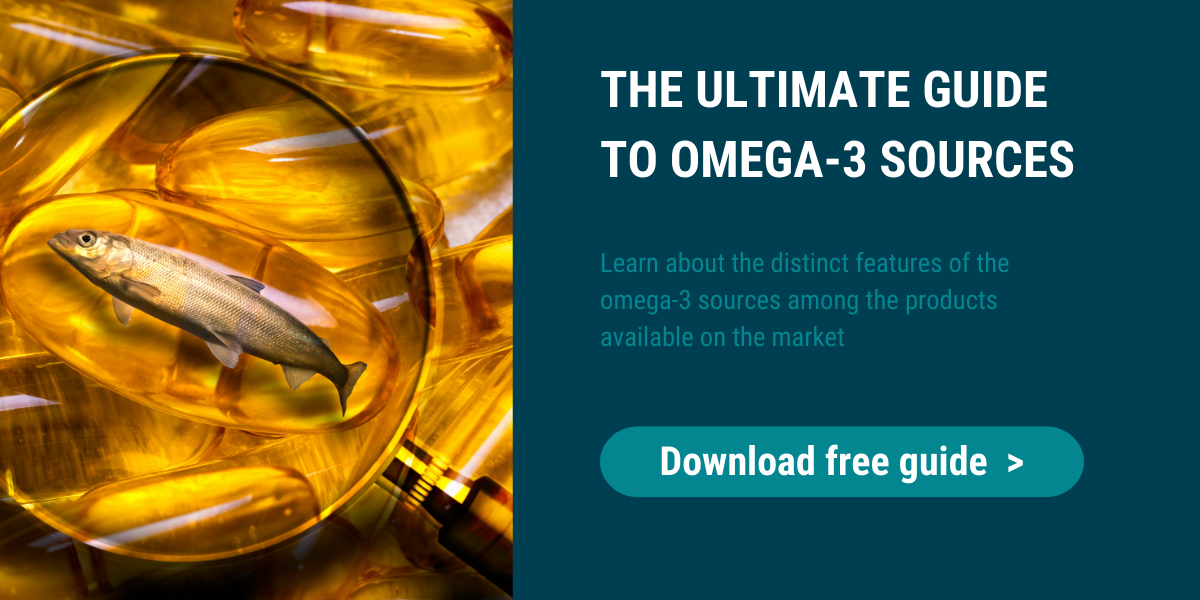Omega-3 fatty acids are crucial for our overall health and wellbeing, so that our bodies can function in our day-to-day life. Unfortunately, the human body can not produce these fatty acids by itself. To maintain good health we therefore need to consume high-quality omega-3 through food or other supplements.
The three most important long-chain omega-3 fatty acids are:
- EPA (Eicosapentaenoic acid) An omega-3 fatty acid that is produced only by marine organisms. The main sources are fatty fish or algae. EPA has a number of health benefits associated with it, as it plays an important role as a substrate for several hormones in the human body.
- DHA (Docosahexaenoic acid) Another omega-3 fatty acid that is produced only by marine organisms. DHA is perhaps the most important omega-3 fatty acid for our body, and it is the major fatty acid constituent in our brain and retina. The main sources of DHA are fatty fish and algae.
- ALA (Alpha-linolenic acid) An omega-3 fatty acid found predominantly in plant-based materials such as flax seeds, chia seeds, hemp seeds and walnuts. Although it is considered an essential nutrient, it has less health benefits associated with it than the other essential omega-3 fatty acids EPA and DHA. The human body is able to convert ALA to EPA and DHA, but only to a very limited degree.
These omega-3 fatty acids are especially important to maintain:
- A normal function of the heart
- Maintenance of normal blood pressure
- A normal brain function
- A normal vision
This is what you should consider when choosing high-quality omega-3 product
The omega-3 source is important
When you are buying an omega-3 supplement, you can start with finding out if the product is made from marine organisms (fish, algae, crustaceans) or plants. Remember that the latter form does not contain the two most important omega-3 fatty acids EPA and DHA. Furthermore, if you are looking for a product based on marine omega-3 you should also consider which source has been used. Why?
There are numerous sources of omega-3 fatty acids available on the market, and each of them has some distinct features. These features can for example be related to the content of EPA/DHA, the form these fatty acids occur in, the presence of antioxidants, or other features which could influence if an oil is suited for a particular application area. Whether you are a brand owner planning to launch a new omega-3 product line or a consumer looking to buy supplements for your family, it is important to understand which source best fits your needs.

Consider the environmental impact of the omega-3 source
As already mentioned, omega-3 fatty acids can be produced from many different fish species, found all over the world. Not all of these are sustainability managed. If you choose an omega-3 product that names the specific geographic origin and/or species used, chances are good that they are sourcing from a sustainably managed fishery.
In addition, supplements composed of multiple omega-3 sources from undefined areas will most likely have a poor carbon footprint due to the increased transportation required for complex supply chains. If you can, buying a product which is produced locally is often a good idea.
Remember to evaluate the sustainability of the product before buying it.
Look for milligrams of EPA and DHA instead of total milligrams of omega-3
EPA and DHA are considered the active ingredients of an omega-3 supplement, and is what really reflects the health benefits. As an adult, you should consume about 500 milligrams of EPA and DHA per day.
Is the company behind the product hiding anything?
Transparency is the key to get the complete and correct truth behind the product. This means that you should be able to get an insight in the whole process from where the fish is caught, and all the way to your kitchen table. Only when this information is available, it is possible to make informed choices based on what is important for you.
Well-known sources of the essential omega-3 fatty acids EPA and DHA include
- Anchovy
- Sardine
- Cod
- Herring
- Salmon
- Krill
- Algae
Consuming omega-3 is one of the best things you can do for your health and well-being. However, there are numerous omega-3 sources and a myriad of different products available on the market. To find the one that best fits your needs requires a bit of investigation, but with the knowledge you have just gained, you should be able to make well-informed choices.


